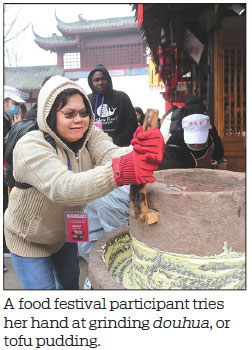World acquires appetite for bean paste
Renowned the world over for being mouth-puckeringly numbing and spicy, Sichuan cuisine would not be able to attain its own lofty culinary heights without another less well-known ingredient: spicy Pixian bean paste.
The sauce, produced in Chengdu's Pidu district, formerly known Pixian county, is made of chilies originating from South America and broad beans from western regions in ancient China. It was a convenient accompaniment of the cultural exchanges between the East and the West, and an innovation after the combination of the culinary culture of northern and southern China.
The sauce has a history of more than 300 years, introduced by the Chen family, after they moved from Fujian province in East China to Pixian county in Chengdu.
Due to the long journey, broad beans carried with the Chen family were getting mouldy. Unwilling to throw away the beans, the Chens tried to refresh them by adding chilies and salt, dried them in the sun, and finally created a delicious condiment.

Based on their original methods, later generations have improved the sauce by adding flour to the beans during fermentation.
With Sichuan cuisine now ubiquitous around the world, the sauce has gained fame in China and abroad.
In 2018, Pixian bean paste, whose brand was evaluated at 65.6 billion yuan ($9.58 billion), ranked top among geographical indications concerning processed food nationwide. The popular paste has been exported to more than 80 countries and regions.
To encourage the condiment production, authorities of Pidu district plan to build a 9.4-square-kilometer Sichuan cuisine industrial park for such products, aiming to develop the district into a global Sichuan cuisine raw materials production and distribution center. As one of 66 key industrial zones in Chengdu, the park is key to the city's efforts to expand the food and beverage industry with an aim to increase its annual output value to 100 billion yuan, local officials said.
To date, 81 companies have invested in 92 food and beverage projects at the park's 5.4 sq km completed area. They have created more than 12,000 jobs and boosted the agricultural industry in the surrounding areas, including farms covering more than 13,333 hectares.
In April, Pidu district signed an agreement with e-commerce giant Alibaba to promote the sauce online, and upgrade and transform the park's companies with digitalization.
liangkaiyan@chinadaily.com.cn
(China Daily 05/15/2019 page18)














